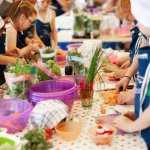Bees are vital to our lives; without them, there would be no almonds, and few apples, onions, blueberries, carrots, or even, perish the thought, coffee. According to the Center for Biological Diversity, "more than half of North America’s 4,000 native bee species are in decline, with 1 in 4 species at risk of extinction.” The standard narrative in the words of Food and Water Watch is that “Bee colonies are in the midst of a massive die-off, thanks to dangerous pesticides that poison them and destroy their habitats.” A new study in Nature debunks that belief.
Food & Nutrition
“Claims like 'healthy' on food labels can provide information to consumers to help them identify healthier food choices at a glance. Foods must meet specific nutrient-related criteria to use the nutrient content claim 'healthy.'” So begins the FDA’s quest to label what is healthy and what is not. Good luck with that fool’s errand.
The Wall Street Journal reports that the cost of eggs increased by about 60% in 2022, more than any other grocery store item on the shelf. Every day breakfast has become a source of anxiety as families look for affordable, healthy alternatives. And what to do about Easter Eggs for the children? The high price of eggs may be causing many families to rethink their eating habits.
“Artificial sweeteners have been widely introduced into the food chain … ” While perhaps helpful in reducing weight, could they unintentionally promote poorer cardiovascular outcomes? A new Cleveland Clinic study suggests yes. But that yes comes with a great deal of uncertainty.
The world's biggest consumer hoax is organic agriculture, which pretends to be what it isn't. And very successfully.
The American Academy of Pediatrics (AAP) has drawn fire for issuing new recommendations designed to reduce childhood obesity. The AAP's critics are deeply confused.
The simple formulation "calories in vs. calories out," somewhat explains weight gain or loss. A new study takes a deeper look at four components of calorie intake and how they change across various dietary patterns. Are tasty hyper-palatable foods the “Great Satan?”
Mara Altman wrote in the NYT that people of shorter stature are better for the planet. Mara claims that the natural resources needed to support a shorter person are less than for a taller person, even though the author acknowledges that shorter people live longer (which may negate the benefits of short stature). Since both genetics and environment determine a person’s height, it was not clear whether the author was advocating that: we manipulate the human genome to breed shorter people, we pair couples to include at least one short partner, or we restrict protein intake with a vegan lifestyle to reduce human stature.
The December 19 Consumer Reports headline, “Lead and Cadmium Could be in Your Dark Chocolate,” has chocoholics everywhere in great pain. But a closer look at the article shows that you may not have to give up your guilty pleasure.
Fruitcake aficionados, my apologies in advance. It's holiday time and some of you will receive a re-gifted fruitcake that is ??? years old. But how old? You learn how to figure this out (it's the same way fossils are dated) when you read the Christmas Special “Dreaded Chemistry Lesson From Hell” below. We will also explore whether the fruitcake is the worst gift ever. From all of us at ACSH, have a happy and fruitcake-less holiday season.
As a toxicologist, I love writing about toxic substances, so I thought I would look for one associated with Thanksgiving. I failed. Many of our traditional Thanksgiving foods are not only non-toxic, but they are also healthy for you!
On November 26, 1959, "Mamie Eisenhower served applesauce with dinner." … America had been waiting with more-than-usual interest to see what the Eisenhowers would eat as Thanksgiving relish. The news came Friday, courtesy of the Associated Press: “No Cranberries for President.” Here's ACSH's take from our archives, in what was perhaps the first episode of chemophobia in the United States.











